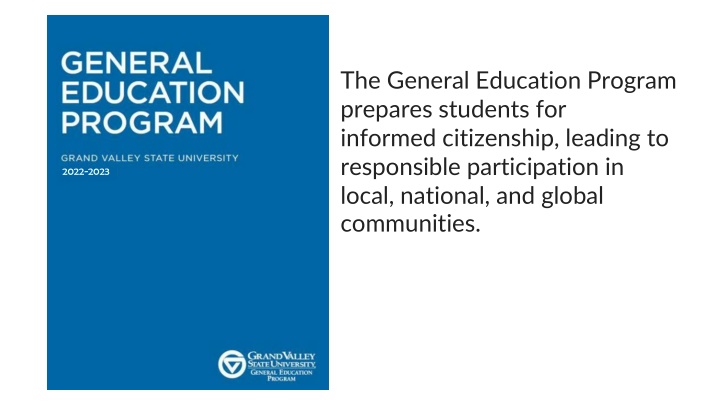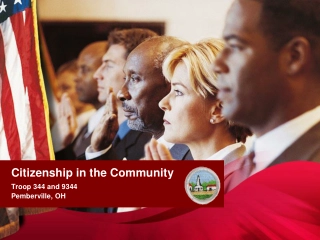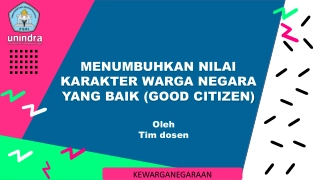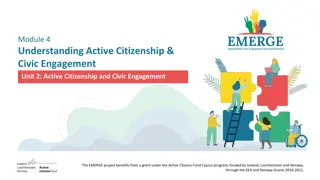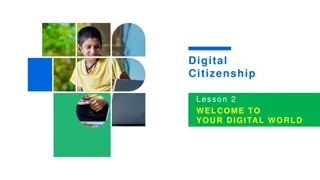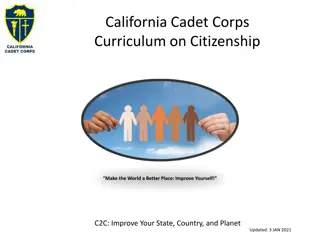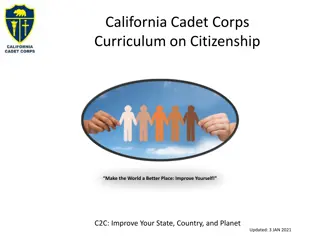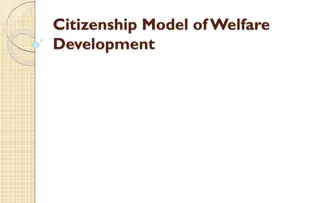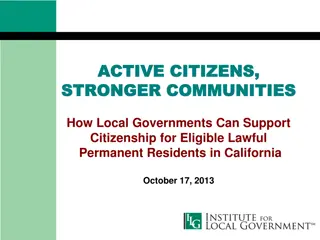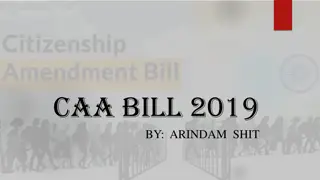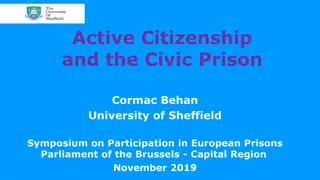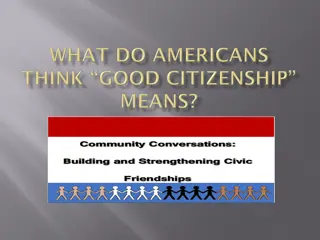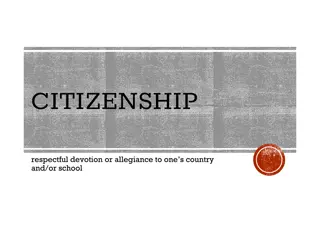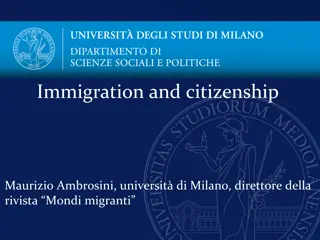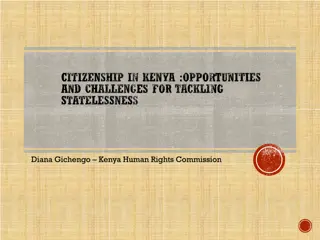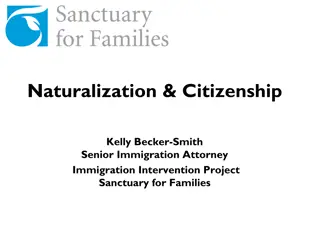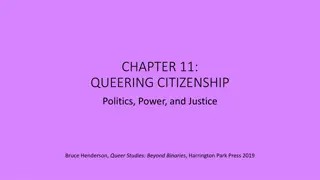General Education Program for Informed Citizenship
The General Education Program at the institution prepares students for active participation in local, national, and global communities by offering a well-structured curriculum that includes foundational courses, cultural exploration, and in-depth analysis of contemporary issues. The program emphasizes critical thinking, problem-solving, and collaboration, equipping students with the necessary knowledge and skills to engage responsibly in society. Through a diverse range of courses spanning various disciplines, students are encouraged to broaden their perspectives and develop a deeper understanding of the world around them.
Download Presentation

Please find below an Image/Link to download the presentation.
The content on the website is provided AS IS for your information and personal use only. It may not be sold, licensed, or shared on other websites without obtaining consent from the author.If you encounter any issues during the download, it is possible that the publisher has removed the file from their server.
You are allowed to download the files provided on this website for personal or commercial use, subject to the condition that they are used lawfully. All files are the property of their respective owners.
The content on the website is provided AS IS for your information and personal use only. It may not be sold, licensed, or shared on other websites without obtaining consent from the author.
E N D
Presentation Transcript
The General Education Program prepares students for informed citizenship, leading to responsible participation in local, national, and global communities. 2022-2023
OVERVIEW OVERVIEW General Education Program How it is laid out Double-dipping Prerequisites Choosing a GE category for your course SAIL
Each GE Category has 1-3 Knowledge outcomes Each GE Category has 2-3 Skills outcomes
FOUNDATIONS [100-200 LEVEL] the major areas of human thought and endeavor. These courses present the academic disciplines as different ways of looking at the world, introduce you to the varied methods used to create knowledge, and acquaint you with major questions and principles of the field. Arts Historical Analysis Mathematical Sciences Physical Sciences Life Sciences Philosophy and Literature Social and Behavioral Sciences (2 courses from 2 different prefixes) Writing Faculty must teach 2-3 Knowledge and 2 Skills outcomes
CULTURES [100-400 level] recognize yourself as a cultural being, and to understand the diverse ways in which people organize life and perceive the world. It enhances your ability to live and work intelligently, responsibly, and cooperatively in a multicultural nation and an interdependent world. Global Perspectives U.S. Diversity Faculty must teach 2-3 Knowledge and 2 Skills outcomes
ISSUES [300-400 level] integrate learning and co-curricular experiences to build connections between prior understanding and new learning. Issues courses are problem-solving courses that encourage cross-disciplinary collaboration within each class. They also develop your understanding of some of the most compelling issues of our time: globalization, health, human rights, identity, sustainability, and the connected topics of information, innovation, or technology. 2 Issues courses Faculty must teach 1 Knowledge and 3 Skills outcomes Issues are the unique aspect of our GE Program a critical aspect of the course is teaching the skills of collaboration, problem solving and integration at the upper division level
Double Double- -dipping Courses can double-dip be in 2 GE categories Foundations + Cultures Issues + Cultures Courses cannot Be in 2 GE Foundations Double-dip between Foundations and Issues dipping You will be responsible to TEACH and ASSESS Knowledge and Skills outcomes in BOTH categories if your course double-dips
Prerequisites Prerequisites Foundations provide foundational knowledge so they have few prerequisites Occasionally WRT 150 is a prerequisite. All Issues courses must have Junior standing You can have few other prerequisites. You can have completion of X GE Foundation but most students have completed every Foundation before Issues. You cannot restrict the course to a major or minor.
CHOOSING A GE CATEGORY CHOOSING A GE CATEGORY
1. Look at the level of your course 1. Look at the level of your course If you are teaching at the 100 or 200 level - it is a Foundation course 300 or 400 level - it is an Issues course 100-400 level - it is a Cultures course
2. Read the category description in the GE 2. Read the category description in the GE Handbook Handbook Foundations - Philosophy and Literature Literary and philosophical works represent an ongoing conversation about the fundamental ideas and values that shape cultures and civilization. To participate fully in this conversation requires knowledge, both of those works that are recognized as defining the history of the conversation and of works that offer original or critical additions to it in the present. Through the study of great works of philosophy and literature, you will come to understand more clearly your own response to the world and to the ideas that give it form and comprehensibility. Courses in this category introduce you to the interpretation of a significant body of literary or philosophical work and assist you in the careful reading, discussion, and analysis of primary texts.
3. Read the Knowledge outcomes 3. Read the Knowledge outcomes Explain principles and questions that define philosophy or literature and its contributions to human knowledge and civilization. Explain the relationship between the works discussed, the cultures in which they were created, and the human concerns they illuminate. Analyze and interpret one or more primary texts as a major portion of course content. You have to teach ALL of the Knowledge outcomes
4. Choose the Skills outcomes associated with 4. Choose the Skills outcomes associated with your category your category Read the definition of the Skill and the objectives associated with it. You have to teach ALL of the objectives. All of the Skills must be taught and assessed regardless of the course modality (online, hybrid, face to face). You don t have to worry about online if you aren t proposing it for online or hybrid delivery.
Oral Communication: Effectively prepare and deliver a formal oral presentation. Students must give individual formal presentations; group presentations are acceptable if every student presents. Presentations must be at least 5 minutes in length. Objectives 1. States a thesis that is compelling, precisely stated, appropriately repeated, and strongly linked to the supporting material. 2. Organizes the presentation in a clear, consistent, and cohesive manner. 3. Uses language that is imaginative, memorable, compelling, appropriate for the audience, and enhances the effectiveness of the presentation. 4. Uses delivery techniques that make the presentation compelling and the speaker appears polished and confident. 5. Uses a variety of supporting materials that significantly enhances the presentation.
SAIL SAIL
The SAIL Process The SAIL Process 1. You 2. Unit Head 3. Library/IT fast 4. If it is online/hybrid it goes to the Online Education Council 5. College Curriculum Committee 6. Dean - fast 7. GE 8. UCC 9. Provost
Why is the SAIL process slow? Why is the SAIL process slow? Backlog sometimes at the College level You don t respond quickly to amendments! Tip reviewing bodies try to stay in their lane (most College Curriculum Committees say nothing about the contents of the GE form). Tip most reviewing bodies ask for amendments.
Deadlines for submission Deadlines for submission There really aren t any But, your unit can t schedule a new course until it is approved! If you want the course to be in the GE Handbook you need to be through the GE Committee by Feb. 1. This is particularly important for Foundations.
SAIL 101 SAIL 101 New Course proposal Why you are proposing it SOR GE Form Course Change Proposal What you are changing SOR GE Form
GE FORM GE FORM Knowledge Outcomes Describe how will you teach Describe how you will assess Skills Outcomes Describe how will you teach Describe how you will assess
TIP: Write for your audience TIP: Write for your audience The College CC, GEC, and UCC are NOT in your discipline. What is self-evident to you, is not to us Examples can help us understand what you mean
TIP: Teaching vs. Assessing TIP: Teaching vs. Assessing Teaching is what YOU do. Assessing is a product that the STUDENTS produce (report, presentation, answer a test question).
TIP: Teaching the Skills TIP: Teaching the Skills It is NOT enough to have students give an oral presentation, write a paper, do problem solving, or work in a group. You have to TEACH them how to do it. Go over the GE Skill Rubric in class. Have them brainstorm good/bad examples. Show a good/bad YouTube video examples. Show/describe an example in class.
TIP: Assessing student learning TIP: Assessing student learning You have to use the GE Rubrics You have to be able to assess students individually which means you can t really use a group written paper to assess written communication You can t use grades For an overview to assessment check out the Assessment PowerPoint on the GE Website
SPECIAL TOPICS COURSES SPECIAL TOPICS COURSES Special Topics courses are designed to let you test drive a course before you propose it for a permanent course number in SAIL. You can propose a Special Topics course (180, 280, 380, 480) for GE You can only offer the course twice before it must go to SAIL GE approval is for one semester The Special Topics Form happens outside of SAIL (it is a streamlined version of SAIL) All the GE rules apply to the Special Topics course
